|
|
|
Sort Order |
|
|
|
Items / Page
|
|
|
|
|
|
|
| Srl | Item |
| 1 |
ID:
152083
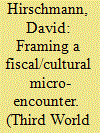

|
|
|
|
|
| Summary/Abstract |
This article focuses on the performance of the calypso song ‘VAT on You’, as a response to the introduction into Dominica of the value added tax (VAT). The article applies a set of concepts to frame and so enhance our understanding of the event in terms of global history. Both calypso and VAT have extended histories and this performance represents an unusual meeting of earlier and current forces of globalisation. The conclusion assesses the helpfulness of the framing concepts ‘longue durée,’ continuities, centring, class divisions and micro-resistance, and assesses the song’s contribution to such resistance
|
|
|
|
|
|
|
|
|
|
|
|
|
|
|
|
| 2 |
ID:
103357
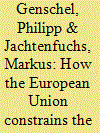

|
|
|
|
|
| Publication |
2011.
|
| Summary/Abstract |
This article challenges the common assumption that the European Union (EU) has little power over taxation. Based on a comprehensive analysis of EU tax legislation and European Court of Justice (ECJ) tax jurisprudence from 1958 to 2007, the article shows that the EU exerts considerable regulatory control over the Member States' taxing power and imposes tighter constraints on Member State taxes than the American federal government imposes on American state taxation. These findings contradict the standard account of the EU as a regulatory polity that specialises in apolitical issues of market creation and leaves control of highly politicised core functions of government (defence, taxation, social security, education, etc.) to the Member States; despite strong treaty safeguards, national tax autonomy is undermined by EU regulation.
|
|
|
|
|
|
|
|
|
|
|
|
|
|
|
|
| 3 |
ID:
170704
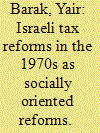

|
|
|
|
|
| Summary/Abstract |
The income tax reform in Israel that was introduced in August 1975 bridged two ostensible objectives: the enlargement of levying and the provision of a redistributive mechanism. In other words, it aimed to establish a system that would simultaneously achieve economic efficiency and social justice. The reform was unique since it invented an original Credit Points mechanism that linked together efficiency and distributive justice.
Introducing the Value Added Tax a year later was also justified as an indirect progressive tax that could be related to as a business tax rather than as an expenditure tax, levied directly on customers. One of the main concerns of the leading academic economists during that period was the enlarged socio-economic gap. Hence, the two tax reforms were also justified by pro-social arguments.
|
|
|
Key Words
|
Economists
;
Direct taxation
;
Military Burden
;
VAT
;
Tax Burden
;
Credit points, direct tax reform, economists, family grants, inequality, Israbluff, military burden, tax burden, social gap, VAT,
|
|
|
|
|
|
|
|
|
|
|
|
|
|
| 4 |
ID:
138553
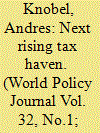

|
|
|
|
|
| Summary/Abstract |
BUENOS AIRES, Argentina—Traces of explosives, sharp metal objects, and seemingly innocent liquid containers are checked daily for every passenger trying to board a plane in the United States. A CIA document obtained by Wikileaks describes even more subtle screenings performed by undercover agents in foreign airports looking for signs of nervousness. Customs officers are trained to detect lies, inconsistencies, or unusual behavior. Still, it took years before UBS banker Bradly Birkenfeld’s secret for shiny teeth was discovered. He was smuggling diamonds in toothpaste tubes on behalf of American tax evaders.
|
|
|
|
|
|
|
|
|
|
|
|
|
|
|
|
| 5 |
ID:
138115


|
|
|
|
|
| Summary/Abstract |
The policy debate on manufacturing in India often gets confounded by a poor articulation of its objectives and by a weak rationale for its industrial structure. The 2013 Economic Survey of India put its finger neatly on one of the objectives and a key issue at stake here—the extent and quality of employment1—though the UPA2 government could not implement its own manufacturing policy during its tenure. That a robust manufacturing helps build deep technological capabilities in our society, thereby making the nation strategically strong, escapes much of our policy thinking. Whether the NDA3 government’s “Make in India” plan will change the face of India (a potential that exists) or will it just remain a slogan of intent will depend, to a large extent, on our understanding of the second aspect of the policy confusion in manufacturing—why do we do, what we do and how we do it—the rationale behind the our industrial structure and the resulting competitiveness or lack of it.
|
|
|
|
|
|
|
|
|
|
|
|
|
|
|
|
| 6 |
ID:
135073
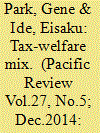

|
|
|
|
|
| Summary/Abstract |
Despite having the highest level of public debt in the Organisation for Economic Co-operation and Development (OECD), higher than Greece or Italy, Japan has one of the lowest aggregate tax burdens of the advanced industrial democracies. This paper asks why Japan, once described as a strong developmental state, has had such a weak extractive capacity, an inability to raise revenues to confront deficits and public debt? In contrast to the existing explanations that focus on political institutions, partisan preferences, or economic globalization, this article argues that Japan's ‘tax–welfare mix’ – the combination of taxes and redistributive welfare polices – undermined the state's long-term capacity to secure adequate tax revenue. More than just a source of revenue, taxes can be used directly to achieve redistributive goals, such as targeting low taxes and exemptions to specific groups. This study shows how Japan's tax–welfare mix diminished its extractive capacity through three mechanisms: the political lock-in of a redistributive social bargain struck around low taxes, the timing and sequencing of its tax policy and welfare development, and the erosion of public trust, which undermined tax consent. Beyond offering a new theory of extractive capacity, the tax–welfare mix explains aspects of Japan's tax structure that defy existing explanations and contributes to our understanding of the capitalist development state by highlighting the redistributive political function of tax policy and its long-term impact on state capacity.
|
|
|
|
|
|
|
|
|
|
|
|
|
|
|
|
|
|
|
|
|